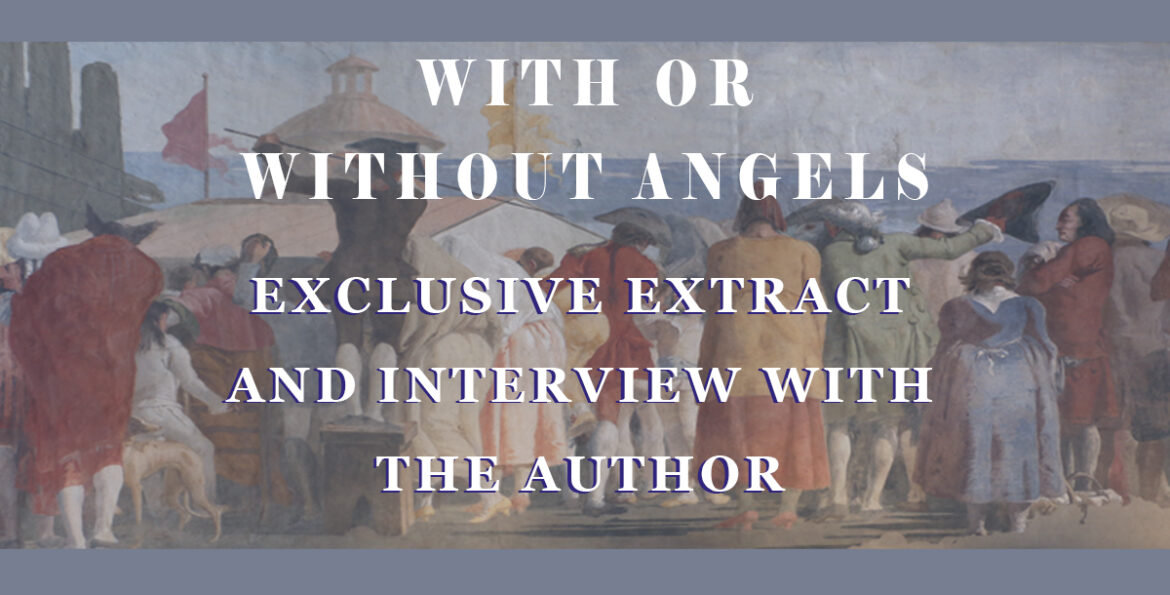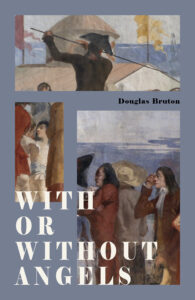

Douglas Bruton interview and exclusive extract
- 23rd February 2023
- Category : Author,Blog,Interviews & Blogs
Douglas Bruton is the author of With or Without Angels, a hybrid and innovative short novel that responds through fiction to The New World, the final artwork by the late artist Alan Smith – which is in turn a response to an eighteenth-century fresco, Giandomenico Tiepolo’s Il Mondo Nuovo. With sparkling, dreamlike prose, Bruton weaves a story around these artworks, arriving at both a profound exploration of the creative process and a timeless love story told in a new way.

Were there any difficulties or advantages to working with pre-existing artwork?
I wouldn’t say that working with pre-existing artwork brought specific disadvantages or advantages as such. When Alan Smith was talking about his New World pictures he said they each had a story and that he was interested in stories and telling stories, but he did not say what the story was in each picture, believing that was not his job and it was instead the job of the viewer to ‘see’ the story. I liked that very much; it was a gift, giving me free rein to write my story of his pictures. I looked at Alan Smith’s artwork for hours, absorbing the works, breathing them in; after that, the writing came quite easily, like breathing out.
What was the biggest inspiration behind this novella?
Alan Smith was the biggest inspiration, both his work and the man – insofar as I could know the man from his words. The book is a response to him and his work. I think of it as a collaboration with the artist (although I never met him) just as Alan Smith’s work is a collaboration of sorts with the work of the eighteenth century artist Giandomenico Tiepolo, specifically Tiepolo’s New World fresco.
Have you always wanted to incorporate artwork into your writing?
It is not something I set out to do, but I am glad that I did. I am always interested in doing new things with my writing, telling stories in new ways. That is, I believe, what drove me to respond to Alan Smith’s work in the way that I did. I think Fairlight Books have produced a very pretty book, one that I am excited to share with people and that I think people will like as a ‘thing’ to hold and to own. I also think Alan Smith would have been pleased to see his work reproduced so sensitively.
How has your experience writing Blue Postcards and With or Without Angels differed?
Blue Postcards tells three stories that interconnect with each other; With or Without Angels tells the one story. Writing them both was a joy. I tend to write quite intensely once I am embarked on the writing. Blue Postcards took six days and it came out of my head just as you see it; With or Without Angels took seven days and also came out just as you see it on the page. There was no plan for either book, just a wee bit of research before starting and then writing to see where it was going to take me. I write like a reader, not knowing what comes next and wanting just to follow the thread of the story to find out. This was the case for both books. Thus, to address your question, I find it hard to think of the writing experiences as different for both books, but rather quite similar.
Why did you choose themes of mortality and love?
I think love as a subject is something that creeps into my writing whether I will it or not. It is something universal and it preoccupies my thoughts. Mortality is something a little newer, however. That may be an age thing as I am a lot nearer the end of my life than I am near to the beginning. It is something I think about. And what I will leave behind me is something I think about too. It’s maybe why I write, so some part of my voice is left ‘talking’ after I am gone (I hope that is not too morbid because I do not think of it as morbid).
What is the biggest lesson this book has taught you?
I am not sure I am looking for lessons when I write. As I have said, I write to tell stories – that’s mainly it. And to tell them in a way that is interesting. The stories have to have some meaning but I do not think my writing is something I do to learn about life. In fact, I did not write this book with any thought of publication. I wrote because I had to, just as when you see something funny you cannot help but respond to it with a laugh or a smile, or something poignant and you shed a tear. If I have learned anything, or at least what the experience of getting this book ‘out there’ confirmed for me, is that there are genuinely good and generous people in the world: once it was written I shared the work with the wife of the late Alan Smith and with their grown-up son – they were the ones who said I should seek publication for the work. And they allowed me to use Alan Smith’s art in the book even without my asking. There is goodness and generosity.
If you want a reader to take away one lesson from With or Without Angels, what would it be?
I have been a teacher in a Scottish high school for most of my adult working life. I loved the job, but that I think was enough teaching to do me. With my books, I hope people read them for the stories. When Blue Postcards came out it was reviewed in The Scotsman newspaper. Stuart Kelly, the reviewer, said of the book ‘as well as being clever it is kind’; I hope readers get that from With or Without Angels too.
*
Keep reading for a sneak peek of With or Without Angels…
He was not well. Something he had eaten perhaps, but there was more than that, too. He told his wife he wasn’t feeling strong today, a little uncertain on his feet. She looked disappointed. They had an arrangement. She thought he needed to get out of the apartment, that it would do him good, just to be a step closer to normal. It would do her good also.
He dressed quietly and slowly and he did not allow her to help. She watched him, looked for signs of where the pain was, noticed the way he used his body to soften the hidden smart and sting, but the pain was still there in his face.
‘We can go another day,’ she said.
He took a breath, drew it deep into his lungs, the bad one and the good. He called for his shoes.
‘Only, it might do you some good,’ she said, sensing a change in him.
She wrapped a scarf about his neck, soft and thick as a caress.
‘It’s cold out,’ she said.
He put on his coat, buttoned chin to knee, and picked up his stick.
‘Right,’ he said.
What it was to feel old, he thought. To feel the effort in each breath, the pull and swallow of air, the shortness, the stifling of a cough. There was a stiffness in his back and his legs, and a feeling of everything needing oiled. He straightened and stood tall – not as tall as he’d once stood, nor so straight. He leaned a little heavily on the stick and a little on his small wife.
‘Camera?’ she said.
He patted his coat pocket, reassured that he had not forgotten the camera. Or maybe she had remembered it and had put it in his coat pocket for him. He wasn’t sure. Things were cloudy some days, in his head.
Out on the street the air was wet and chill and shifting. It smelled of bus exhausts and damp wool and faintly of cigarettes. And his wife it smelled of, too. Something with flowers in her perfume. Patchouli maybe – a shrub of the mint family – something of wet soil or apples that are past ripe, the smell of a cork pulled from a bottle of strong red wine. It’s the last of the senses to go, smell. He had heard that somewhere and was comforted that when all else failed he would know his wife was at his side by her smell.
He cleared his throat, as though he had something to say, but he lost his place – like reading a book, his finger following under each word and then his hand slipping from the page and the book fallen from his grasp so the covers closed and he did not know where he was in the book and so he had no words to share. She would scold him if she could read his thoughts.
‘No, no, no. We’ll have no talk of failing and the end of things and closed books and being old.’
She had bought him the camera. He could no longer hold a pen or a brush, at least not for any time. He tucked a pencil behind one ear some days, just to remind himself of what he was, what he had always been. He arranged paper on his desk and ran the flat of his palm across the surface, feeling the soft and familiar velvety burr. There’s a smell to paper too, and when he was by himself he leaned in close and breathed that smell in, dry and something sweet and old – he was certain ‘old’ was a smell.
He took pictures all the time now, arranged like a diary in the memory of the camera. That way he need not fuss over what had happened when. Pictures of meals he ate and people who came to call and paintings he saw in books that meant something. When he later leafed through the pictures he’d taken, he sometimes smiled at the memory; sometimes, too, he puzzled over the picture he’d taken, not understanding why.
*
With or Without Angels published 16 February 2023. Order now from Bookshop.org, Blackwell’s and Waterstones.














